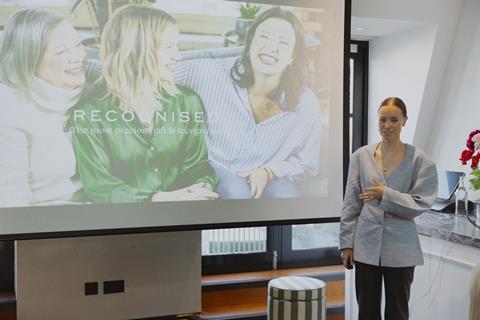Founder of jewellery business Recognised and Young Businesswoman of the Year 2021, Anneka Wallington, shares the five lies she’s had to overcome when establishing a successful company.

I’m now in my fourth year of running a business and I’ve spent a lot of that time with the lies in my head and myths that surround business and how it should be done. From believing that quick and rapid scale is the true mark of success to cramming a life-time of work into my twenties before having children, the lies we buy into impact not only the way we run our businesses but the way they can run us. Stopping to question these untruths is the single greatest thing I’ve done for my business. Through doing so I have found new freedom in dictating the rules I play by, the values I live by and the type of life I want to lead. There is great peace to be found on the other side wrestling with and disarming these lies, some of which I’m sure will be familiar, I hope you too will encounter great peace.
Lie 1: A business which grows quickly is successful
Arguably the most pernicious lie within the business landscape: quick = success. We live in the era of overnight success stories, from The X factor to Emma Raducanu, we elevate quick success before looking at the years of grit, resilience, knock backs and pain. When you look closely it turns out these stories were not in fact overnight successes but instead night-over-night-over-night successes. The reality is, true overnight success stories are far and few between. Rome wasn’t built in a day and the best businesses today have been built over multiple generations.
This lie has taken hold of so many of us and causes unsustainable self pressure and a perpetuating cycle of discontentment. Stopping to redefine what success looks like for your business will transform your business from the inside out, eliminating comparison, anxiety and ensuring your performance evaluation is aligned with your measure of success and no one else’s. From a spiritual perspective I have found great comfort in the words Jesus spoke: “Well done, good and faithful servant”. I wonder whether God’s measure of success is the degree to which we faithfully walk in obedience to the call on our lives? All he requires of us is to be good and faithful.
Lie 2: Investment is the only way to scale a business
I will premise this with the fact that Recognised has raised several hundred thousand pounds since inception and are hugely grateful for our investors who have backed us thus far and helped us grow. I include this lie here for several reasons. Firstly, because for so many, investment is out of reach, only two per cent of venture capital funding was given to female founders in 2021 (Bloomberg, 2022) and just one per cent was given to black founded businesses (Crunchbase, 2021). The inequality here is a reality to acknowledge when starting a business and explore all fund raising options available to you. Second, in more recent years, the investment landscape has instilled the first lie, fueling the market as founders turn to cash to achieve short term success over long-term growth. Fundamentally it is important for every founder to ask themselves what they are trying to achieve and on what timescale. This will be indicative of funding options to take. And always remember to never despise the small things - small things, well nurtured, grow.

Lie 3: You can’t run a business and have children at the same time
Believe it or not this is something I’ve heard a lot. Whether it be through the way the media portrays women who advance in their career simultaneously experiencing a home life crisis (The Intern and Devil Wears Prada being prime examples) or through these very words literally spoken to me. This lie caused me to cram a lifetime vision into a few years which led me close to full burn out and to experience overwhelming pressure. Seeing women such as Deliciously Ella and Sherly Sandberg lead thriving businesses while raising young children helped to change these perceptions and remind us all that though life may be more of a juggle for women, it certainly can be done.
Lie 4: I’m not good enough to do this
Hello Imposter syndrome. Technically not a “business lie” but definitely worth mentioning. This is a lie which all too often stops us in our tracks. In fact, 75 per cent of executive women report having personally experienced imposter syndrome at certain points in their career (KPMG, 2021). Sound familiar? I won’t pretend to be an expert on how to overcome this, but I will say: the beauty of entrepreneurship is not being good enough (whatever that means) and giving it a go anyway. All you can truly be is yourself - and that is always enough.
Lie 5: Someone with business experience knows more about your business than you
Over the years of running Recognised there have been more times that I can count to remember where I have felt out of my depth with a decision that needs to be made and totally confused. Fortunately we have been surrounded by many incredible advisors and mentors who have helped us navigate through these decisions. The key thing I have learnt is that while it is important to weigh all the advice you have access to, you can’t outsource responsibility or the decision making. At times when I have lacked confidence I have overly leant on the opinions of others with more experience than me and looked to them for the “right answer”. However, I have come to understand that as a founder, you ultimately know what’s best for your organisation. Like parenting, you take all the advice you can get but the parent intuitively knows what’s best for their child. Don’t underestimate the power of intuition - like
In seeking out advisors for your business I’d look for people with experience in your specific field. Understand where the gold in their wisdom lies and draw it out. A healthy mark of a good advisory relationship is one where they ask you questions, don’t tell you what you do and give advice not expecting you to always act on it, instead trusting you to make the best decision.

































No comments yet